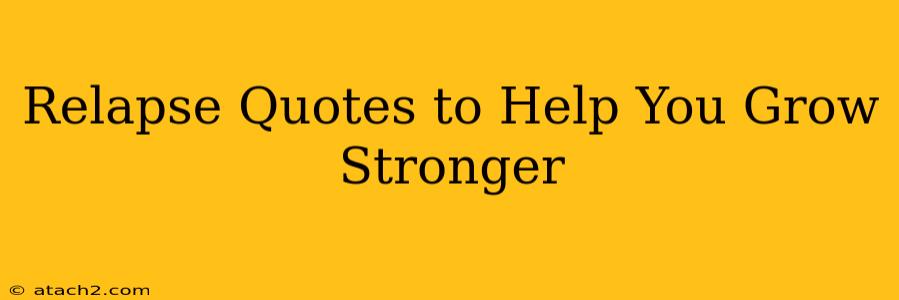Relapse is a painful but often unavoidable part of the recovery journey. Whether you're battling addiction, overcoming a bad habit, or struggling with a mental health challenge, setbacks happen. Instead of viewing relapse as failure, it's crucial to see it as a learning opportunity. These relapse quotes offer powerful perspectives, encouragement, and strategies for navigating these difficult moments and emerging stronger than before.
What Causes Relapse?
Understanding the underlying reasons behind relapse is crucial for preventing future setbacks. Several factors can contribute, including:
- Stress: High-stress situations can trigger cravings and impulsive behaviors. Learning effective coping mechanisms for stress management is paramount.
- Lack of Support: A strong support system is essential. Isolation can increase vulnerability to relapse.
- Unresolved Trauma: Past trauma often plays a significant role in addictive behaviors. Addressing these underlying issues through therapy is often vital.
- Poor Self-Care: Neglecting physical and mental health can weaken your resolve and increase your susceptibility to relapse.
- Lack of a Solid Plan: A well-defined plan, including coping strategies and relapse prevention techniques, is essential. Without this roadmap, it's easier to fall back into old patterns.
"A stumble is not a fall." – Unknown
This quote beautifully encapsulates the essence of resilience. A single setback doesn't define your journey. It's a temporary detour, not a definitive end. The key is to learn from the experience and get back on track.
"The only way to do great work is to love what you do." – Steve Jobs (Adapting this for recovery)
While not directly a recovery quote, this emphasizes the importance of finding purpose and passion in your life. When you're deeply engaged in something fulfilling, it becomes easier to resist temptations and maintain focus on your goals. Finding activities that bring joy and a sense of accomplishment can be a powerful tool in preventing relapse.
How to Prevent Future Relapses?
- Build a strong support network: Lean on friends, family, or support groups for encouragement and accountability.
- Develop healthy coping mechanisms: Find constructive ways to manage stress, such as exercise, meditation, or spending time in nature.
- Seek professional help: Therapists and counselors can provide guidance and support tailored to your specific needs.
- Practice self-compassion: Be kind to yourself during setbacks. Self-criticism only exacerbates the situation.
- Create a relapse prevention plan: Identify your triggers, develop coping strategies, and outline a plan for what to do if you experience a craving or setback. This plan should include who you will contact and what steps you will take to get back on track.
"The difference between ordinary and extraordinary is that little extra." – Jimmy Johnson (Adapting this for recovery)
This quote highlights the importance of consistent effort and perseverance. Recovery is a marathon, not a sprint. Small, consistent steps, day after day, contribute significantly to long-term success.
"What doesn't kill you makes you stronger." – Friedrich Nietzsche
This quote, while often debated in its entirety, speaks to the power of resilience. Overcoming challenges, even setbacks like relapse, builds strength and character. It's in the struggle that we find our true resilience. The experience itself, though painful, forges a deeper understanding of ourselves and our capacity for growth.
Frequently Asked Questions
What should I do if I experience a relapse?
Don't beat yourself up. Acknowledge the relapse, learn from it, and get back on track as quickly as possible. Reach out to your support system and consider seeking professional help. Analyze what contributed to the relapse to prevent future occurrences.
How can I prevent relapse?
Develop a solid relapse prevention plan that addresses your personal triggers, coping mechanisms, and support systems. Engage in self-care, practice mindfulness, and seek professional help when needed.
Is relapse a sign of failure?
Absolutely not. Relapse is a common part of the recovery process. It's an opportunity to learn and grow. The important thing is to learn from the experience and move forward.
What is a relapse prevention plan?
A relapse prevention plan is a personalized roadmap that outlines strategies to manage triggers, cravings, and high-risk situations. It usually includes a list of supportive individuals, coping strategies, and a plan for what to do if you experience a relapse.
This detailed approach to tackling the topic of relapse provides valuable insights and strategies for readers looking to understand and overcome this challenge. Remember, you are not alone, and recovery is possible.

